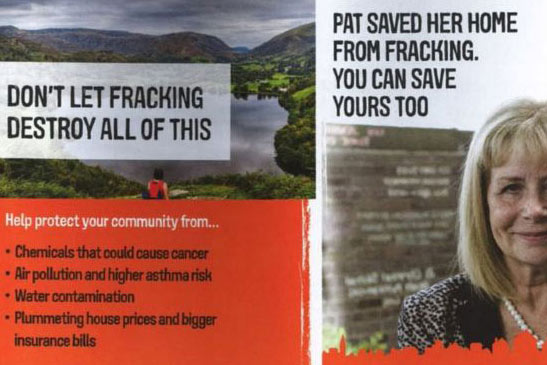Friends of the Earth, a charity that campaigns for environmental causes, has agreed to refrain from publishing again a magazine insert that made unsubstantiated claims about the effect of fracking on people's health, house prices and the ecosystem.
Cuadrilla, an oil and gas exploration and production company, complained to the Advertising Standards Authority about the anti-fracking claims made in the leaflet. The ASA then approached FOE about the complaint. Following the investigation the matter was resolved informally on the basis that FOE agreed not to repeat the claims, or claims with the same meaning.
The fact that the ASA has investigated this piece of political advertising surprised me. Due to the fact I have previously investigated the rules, and and about the lack of regulation of political advertising in the UK, I was confused as to why the ASA was getting involved.
Further research revealed that while the ASA doesn't regulate political ads where the principle function is to influence voters in local, regional, national or international elections or referendums, its regulatory remit does include other advertisements with political subject matter.
In other words, if a charity, trade union, company or government department runs an ad to raise awareness about a cause or idea which is political in intent, but does not seek to influence a vote, the ASA is within its remit to investigate and adjudicate on it.
Apparently it is also able to rule on the content of political parties’ websites.
My improved understanding of the ASA remit has added further weight to my incredulity that Parliament has so far found it impossible to find or found a body to regulate political advertising related to elections and referenda.
A in 1999 said:
"The Government will explore with the main political parties whether there is any other existing or ad hoc body which could possibly oversee a code of practice on political advertising. If a suitable organisation can be found which commands consensus, the Government will help the political parties to reach agreement on the adoption of such a code."
I find the fact that Parliament are happy for the ASA to regulate every single piece of political advertising provided that it doesn’t relate to a vote – but have thus far been unable to find a "suitable organisation" for elections – totally bizarre.
ASA chief executive Guy Parker released a on the Caudrilla / FOE dispute:
"Debates between parties with polar opposite views can become highly fractious. But that won’t get in the way of us taking action to stop problem ads from reappearing."
What a great statement.
Parker is confident in his organisation’s ability to rigorously fact check, take into consideration the strength of emotion involved in political issues, and act decisively.
Now I’m not saying the ASA is the right body to regulate non-broadcast political ads relating to elections (nor am I saying it should be ruled out), but its ability to act impartially on issues such as the FOE/Cuadrilla case – and have its judgment respected – shows that creating an organisation to hold to account those seeking to influence the way people vote is far from impossible and could easily be in place before the next general election.
After the EU referendum, where we saw outright lies continually peddled in campaign posters, it’s important that action is taken quickly in order to restore faith in the honesty and truthfulness of all advertisements, including those of our political parties.
Benedict Pringle is the founder of


